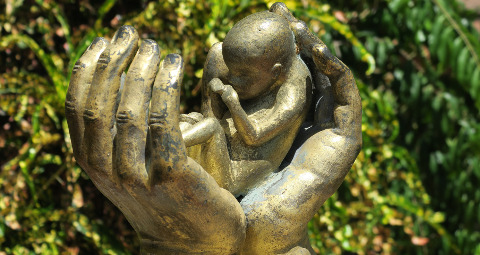March 29 | ![]() 0 COMMENTS
0 COMMENTS ![]() print
print

‘Women who have had an abortion need love and support’
By Clare Bremner
Thirty years ago women who had struggled after abortion and wanted to help other women and their families, as well as spread the truth about abortion, started ARCH, the Abortion Recovery Care Helpline. Today ARCH offers counselling and support to anyone affected by abortion mothers, fathers, grandparents, siblings and healthcare staff—and continues to raise awareness about what abortion does.
In my first three years as a counsellor with ARCH, I have learnt a great deal from listening to hundreds of women and a good number of men. For example, I learned that there is a gulf between the perception of abortion provision among those unaffected and the reality for those who are affected.
Many might imagine that women sit down with a doctor (if not two!) to discuss all their options, all the pros and cons, that they are fully informed and freely consenting. Others might believe women are callously opting for an easy, quick fix to an inconvenient pregnancy. I have never heard of the first happening and have never met a woman who fits the second. The truth is, of course, far more complex.
The scandalous reality is that most women are pressurised or coerced in some way onto that path, whether subtly, brutally or somewhere in between. 75 per cent of women contacting us have experienced some form of pressure or coercion.
The woman may not even realise at the time how and by whom she is being pressured. It is mostly the man, but could be parents, friends, doctors, nurses or others.
Those applying the pressure may have the best intentions and may be (surely most must be) unaware of the consequences for the woman or girl. They may not recognise that such pressure is abuse, and that a coerced abortion is illegal as well as unethical. On the other hand, can we imagine anything worse than a woman or girl being made to abort her child?
Woman after woman after woman has described going through an abortion on ‘autopilot,’ feeling like they were watching a film of events unfolding, alongside panic, hurry and shock. Then, afterwards, the panic is over, the film ends, and a new shock hits. “How did I let that happen?” “Will I ever get over this?” Many feel empty, and want to get pregnant again, even straight away, even if nothing else has changed.
Women and men describe grief, regret, guilt. This grief is ‘disenfranchised,’ as there is precious little recognition or space in our society for it. Furthermore women may believe they have no right to grief and others will often fail to understand where their grief comes from as they ‘chose’ abortion.
Depression, anxiety, suicide risk and self-loathing are experienced by most who contact us. Women can suffer acute stress in the immediate aftermath, with some developing post-traumatic stress symptoms later. Many fear punishment, and many find ways to punish themselves.
Self-hatred can prevent women from seeking help, or become an obstacle to engaging with any help they find. Self-hatred will reinforce other symptoms and is a heavy, heavy burden. What a thing to feel first thing every morning, last thing every night.
Some contact us within hours, some only after decades, whether those years have been decades of suffering or decades living with a buried, secret pain that resurfaced with a vengeance around some other life event, like the birth of grandchild, another loss, or the menopause.
Some of the most heartbroken women we have spoken with are those who never, ever thought they would have an abortion, for example Christians including Catholics who share the Church’s teaching on life from conception.
Often Faith will be a great support and many will find healing through their churches. For example, Isabel who has been helped by Rachel’s Vineyard Retreats and ARCH, said: “Choosing to ask for help to heal from abortion is the best decision I ever made. After years of depression and self-hatred, at times making me not want to live any longer, I feel like I am starting to see in colour again.”
But do all find help through their faith? Christine Fidler of Image says a tenth of our congregations are missing because they have had, or been involved with, an abortion. What is it like for a post-abortive woman or anyone else involved in abortion to be in a Catholic church? When abortion is mentioned, is the compassion and kindness needed always evident? Do remarks from the pulpit or conversations in the porch reflect the truth that most women are pressurised into abortion, that they are hurt more than others can grasp? Thankfully most certainly are compassionate and understanding, but not all. Do others, out of compassion, try to minimise what has happened, as if it’s no big deal, not realising how that can hurt too?
Many post-abortive women and others involved can feel they don’t belong in church anymore, that everyone knows what has happened and judges them. They may doubt that God can really forgive them, and even more so, fear they can never forgive themselves. If they don’t understand how they let their abortion happen, how can anyone else? If that was you, how would you feel? What would you want your parish to understand, to offer? If that was your daughter or granddaughter, how would you like others to be with her? Would you want them to remember the words, ‘Be compassionate just as your Father is compassionate. Do not judge, and you will not be judged’ (Luke 6: 36-37).
If that is you, don’t be afraid to come to Mass, don’t be afraid to make use of Confession. Wouldn’t Jesus tell you to come just as you are, and that He will restore you with His love?
On Sunday, when Mother’s Day is mentioned at Mass, know that we will be thinking of you.
– Clare Bremner is a counsellor at ARCH and in private practice
– The ARCH Befriender Helpline is open every evening from 7pm-10pm and is staffed by volunteers. Everything they offer is with compassion, without judgement, in confidence and free. Call the helpline on 0845 603 8501, or visit www.archtrust.org.uk










